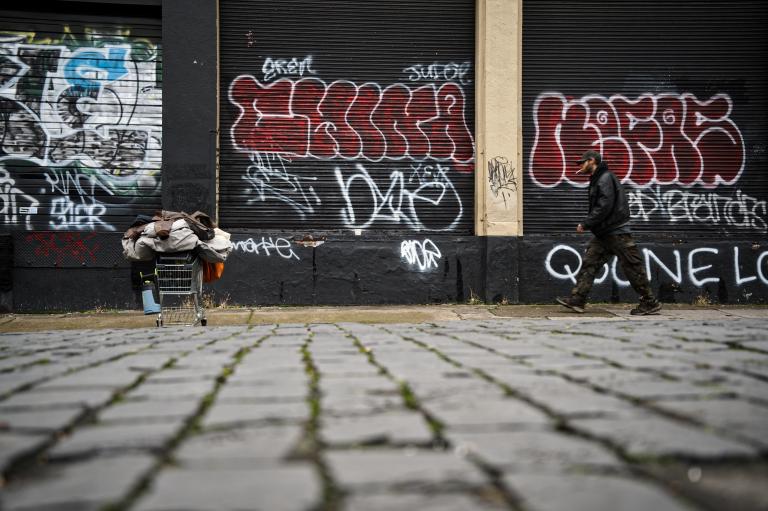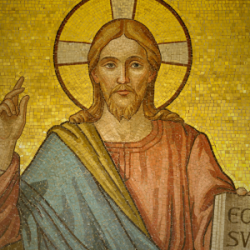Welcome readers! Please subscribe through the buttons at the right if you enjoy this post.

The ethic of charity, taking care of the less privileged, the poor, or the vulnerable sectors of society, long predates the teachings of Jesus. What Jesus is doing here is not admonishing us to take care of the poor but rather announcing that the situations of the poor, the mourning, and the hungry are to be reversed! Jesus was calling for distributive justice not charity.
If we live in a society of limited resources, then for someone to hold on to more than what they need (i.e. wealth) means that someone else is going without what they need. Countless philosophers and sages throughout the centuries have taught this to one degree or another. Gandhi spoke of the earth providing each day enough for every person’s need but not every person’s greed. Karl Marx described our societies as pyramids with the wealthy elite at the top and the masses of working class and the poor at the bottom.
First Century Jerusalem had a similar social structure. The Greek and Roman empires had monetized the region. Historians estimate that over two million Jewish people lived outside of Jerusalem. Each male older than twenty years of age was required to pay an annual half-shekel temple tax, and so the temple amassed an enormous amount of wealth. Josephus recorded Rome forcibly taking money from the temple during its occupation of the region (Sabinus: The Jewish War 2.14; Jewish Antiquities 17.50; Pilate: The Jewish War 2.175-177; Jewish Antiquities 18.60-62; Florus: The Jewish War 2.293). When Judea was placed under a Roman Prefect, the Temple became the primary Jewish political institution. During this time, the Temple took on more of the role of a national treasury and “bank” for the wealthy aristocracy of Jerusalem.
“It is quite possible that, under pressure of this increasingly wealthy elite, the temple began to make loans on their behalf or to hold their capital so they could proffer from such loans to the poor.” – William R. Herzog, Jesus, Justice, and the Reign of God: A Ministry of Liberation.
The wealthy looking for ways to profit from investing their surplus in loans or acquiring land from debtors’ defaulting on loans created an unbearable debt load for both peasants and craftsmen. The farmers needed these loans to survive, the wealthy sought greater profits, and the temple, with its politically and economically privileged aristocracy living in luxury, was at the very heart of a system of economic exploitation. As Josephus records, the burning of all records of debts held in the temple was the first act of the Jewish Revolt that led to the Jewish Roman war (The Jewish War 2.426-427).
The temple had become more than a site for religious worship. It had become the heart of economic oppression. This system created wealth through making others impoverished. This is not new. Christianity has a long history of complicity in exploitative political and economic, societal structures. Jesus does not prescribe charity for the poor as a way to maintain an unfortunate but unavoidable state of affairs in a system that should be left unchanged. Jesus is calling for justice toward the poor and change to the system itself for all who choose to participate.
Jesus announces a path toward a great reversal, where the poor are now benefited, the hungry finally and permanently have enough food, and those for whom the present system caused mourning, they will rejoice. The justice of Jesus involves a change for everyone.
James M. Robinson states in his book The Gospel of Jesus, “It is no coincidence that the oldest collection of Jesus’ sayings, what we call the Sermon (what Matthew expanded into the Sermon on the Mount), begins by pronouncing just such down-and-outers fortunate: it is the poor, the hungry, the mourners who are ‘blessed.’ The kingdom of God is not God’s stamp of approval on the status quo, the powers that be, the ruling class. Rather, it is countercultural, for it gives hope to the hopeless. It is not consoling them with ‘pie in the sky by-and-by,’ but involves concrete intervention in the lives of the needy, mitigating their plight in the here and now” (p. 170).
In Luke’s gospel we come in contact with the wealthy and privileged of Jesus’ society who reject Jesus’ new plan and wealthy, but marginalized tax collectors who embraced it. Luke’s gospel uniquely includes the parable of the rich man and Lazarus, originally a story that the Pharisees told about a rich tax collector and a poor scholar of the Torah (see J. Jeremias, Parables, p. 183). Luke’s Jesus expands the story from being about a tax collector and a Torah scholar to being about all who are wealthy (including wealthy Pharisees) and all who are poor (Luke 16:19-31). We encounter in characters like Zacchaeus tax collectors who respond positively to Jesus’ new economics and choose to give their wealth back to the poor (Luke 19:1-10). And we encounter certain ones of the sect of the Pharisees who “loved money, heard all this and were sneering at Jesus” (Luke 16:14).
“(All the people, even the tax collectors, when they heard Jesus’ words, acknowledged that God’s way was right, because they had been baptized by John. But the Pharisees and the experts in the law rejected God’s purpose for themselves, because they had not been baptized by John.)” (Luke 7:29-30)
Also in Matthew:
“For John came to you to show you the way of righteousness, and you did not believe him, but the tax collectors and the prostitutes did. And even after you saw this, you did not repent and believe him.” (Matthew 21:32)
This rejection wasn’t disagreement about Jesus’s theology. The authorities rejected Jesus’ new economics.
One of the proofs that Jesus sent back to the imprisoned John: the poor having good news proclaimed to them:
“John’s disciples told him about all these things. Calling two of them, he sent them to the Lord to ask, “Are you the one who is to come, or should we expect someone else? . . . So he replied to the messengers, “Go back and report to John what you have seen and heard: The blind receive sight, the lame walk, those who have leprosy are cleansed, the deaf hear, the dead are raised, and the good news is proclaimed to the poor. Blessed is anyone who does not stumble on account of me.” (Luke 7.18-19, 22-23, See also Matthew 11:2-6)
The gospels tell us what that good news was, a great reversal of affairs:
“The last will be first, and the first last.”
“Indeed there are those who are last who will be first, and first who will be last.” (Luke 13:30, cf. Matthew 20:16)
“For all those who exalt themselves will be humbled, and those who humble themselves will be exalted.” (Luke 14:11, cf. Matthew 23:12)
“No one can serve two masters. Either you will hate the one and love the other, or you will be devoted to the one and despise the other. You cannot serve both God and money.” (Luke 16:13, cf. Matthew 6:24)
Again from James M. Robinson’s The Gospel of Jesus, “Jesus must have believed that, in spite of appearances, the givens of life were basically changed: as the ideal becomes real and God rules, there are to be no poor or hungry, no handicapped or sick, no exploiter or enemy, no mentally disturbed or force of evil. Jesus believed that this ideal was the basic reality and acted accordingly.” (Ibid. Kindle Locations 2495-2504).
This brings us to a common misunderstanding of a statement Jesus makes in Mark and Matthew.
“The poor you will always have with you, but you will not always have me.” (Matthew 26:11)
“The poor you will always have with you, and you can help them any time you want. But you will not always have me.” (Mark 14:7)
Some have taken these words to indicate that Jesus is proclaiming that poverty is an unavoidable reality that will always exist no matter what we do. Yet when we understand this statement from a Jewish perspective, we see this is not the case at all.
In Jewish tradition, YHWH had proclaimed that if they would follow the instructions given to them, they would be poverty-free: “There will never be any poor among you if only you obey the Lord your God by carefully keeping these commandments which I lay upon you this day.” (Deuteronomy 15.4, REB, emphasis added)
Jesus is reversing this statement from Deuteronomy when he states, “You will always have the poor among you.”
Poverty is a human creation, and thus, humans could reverse it if they chose to. Jesus is showing a way for his generation to do so through voluntary wealth redistribution rooted in love for our fellow human beings. Yet the wealthy elite of his day rejected his teachings. And as long as they held on to their present system, rather than eliminating poverty they would immortalize it. The choice was theirs.
The poverty of Jesus’ day was the result of an unjust system. And just as following the Torah would have eliminated poverty in ancient Judaism, following the way of Jesus could have eliminated poverty in the 1st Century. Luke’s narrative in Acts explains the results for those who chose to give his economic teachings a try:
“All the believers were one in heart and mind. No one claimed that any of their possessions was their own, but they shared everything they had. With great power the apostles continued to testify to the resurrection of the Lord Jesus. And God’s grace was so powerfully at work in them all that there were no needy persons among them. For from time to time those who owned land or houses sold them, brought the money from the sales and put it at the apostles’ feet, and it was distributed to anyone who had need.” (Acts 4.32-35, emphasis added.)
What were Jesus’s economic teachings? It’s important to remember that Jesus’s teachings were rooted in what he called the reign of God (the kingdom). A world where God “reigns” is a world where I trust God to take care of me by sending people who will care for me while I take care of you and listen to God when God calls me to take care of you!
“[Jesus’] basic issue, still basic today, is that most people have solved the human dilemma for themselves at the expense of everyone else, putting them down so as to stay afloat themselves. This vicious, antisocial way of coping with the necessities of life only escalates the dilemma for the rest of society . . . I am hungry because you hoard food. You are cold because I hoard clothing. Our dilemma is that we all hoard supplies in our backpacks and put our trust in our wallets! Such “security” should be replaced by God reigning, which means both what I trust God to do (to activate you to share food with me) and what I hear God telling me to do (to share clothes with you). We should not carry money while bypassing the poor or wear a backpack with extra clothes and food while ignoring the cold and hungry lying in the gutter. This is why the beggars, the hungry, the depressed are fortunate: God, that is, those in whom God rules, those who hearken to God, will care for them. The needy are called upon to trust that God’s reigning is there for them (‘Theirs is the kingdom of God’).” (James M. Robinson, The Gospel of Jesus)
In the 1st Century, Jesus proclaimed good news to the poor, the hungry, and those who mourn. In our society, whom do you think Jesus would proclaim good news to today? Most definitely it would still be the poor, hungry, and mourning. But whom else would it include? Which other members of our human family would Jesus call you to trust God to send people to take care of you if something should befall you in the future, while calling you to take time to take care of them, today?













